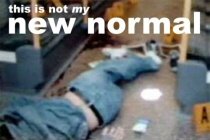
 The lovely new, and intrinsically worthless, £20 note - nothing peculiar to see here, please move on...
The lovely new, and intrinsically worthless, £20 note - nothing peculiar to see here, please move on...Things have reached a very sad state of affairs indeed when the most accurate and perceptive commentary on the financial turmoil of the last few days you can find comes from a satirical online newspaper which talks about stimulating the world economy by giving everyone a puppy...
GLOBAL ECONOMY NOW RUN BY FUCKNUTS
...Wayne Hayes, an analyst at Conceptomatix, welcomed the move to a spaniel-based economy, adding that the breed was one of the biggest single generators of additional spending, more costly even than a fat child...
Meanwhile, Fed chairman Ben Bernanke urged people 'to just buy shit and worry about it later'...
He said: "The world has been brought to the brink of depression by a ridiculous consumer spending spree fuelled by cheap credit and home makeover shows. So let's keep it going."
Bernanke said the only way to prevent the current unsustainable consumer bubble from bursting was by slashing interest rates and creating another even bigger one for someone else to worry about after he had moved to Goldman Sachs...
alternatively you could turn to the (allegedly) less satirical mainstream press and plow through acres of print filled with crap like this...
"It's not absolutely certain that we've bottomed. For the next two days I don't think we'll see as much severe selling as we've seen, so perhaps we will stabilise. I'm leaning more towards there being a rally over the next week, and if not a rally then at least some choppy trading, not more severe selling. After that it's very murky and depends on what the Fed decides."
... and become slightly older, but no wiser
Now that we have the Internet it would be a relatively straightforward exercise to do a series of Google searches for terms like 'soft landing' and bullish projections made for housing and stock markets in the mainstream media over the last few years and sentence all those fools and liars who have helped bullshit our world to the brink of economic collapse to ten years in some Chinese sweatshop assembling ipods

one can but dream...
.




















6 comments:
Ahhhh, how nice:
“Doomsday Seed Vault” in the Arctic - Bill Gates, Rockefeller and the GMO giants know something we don’t
I thought Simon Denham (?) in todays Torygraph got it just about right ...
"The market is looking better this morning as Asian markets also staged a relief rally, and the FTSE is being called to open 20 points better. Since we crashed through the 6000 level, it may not act as a tough resistance barrier, and we could be back up there by the end of the week, especially if the banking sector sees the sort of buying we saw yesterday.
Clients are largely long on the FTSE, albeit in the shorter term as perhaps they expect a run back to the highs set in 2007 to be still a long way off." (C)
There are (I understand pieces of software) that generate random numbers, perhaps they using similiar programs that generate random words, seeded with as such phrases as "economic gobshite" etc.,
I am also stunned by the prescience of this far sighted financ ial analyst .. in 2005 abiuyt one of the most spectacular financial stocks this last 6 months. in Finance WEek
Why Northern Rock is music to the City's ears
Sonia Speedy - 27-Apr-2005
Mortgage lender Northern Rock is highly regarded by City analysts, winning plaudits for the strength of its management team and 'virtuous circle' business strategy. Sonia Speedy examines how the company manages to remain successful in an overcrowded marketplace
The tale that is Northern Rock's business strategy is not a lengthy one. Nor is it complicated, highly diversified, laced with pendulum swings of ups and downs or profit warnings.
The specialised mortgage lender's strategy is simple, plain and, some even suggest, slightly boring. The City loves it.
This month it released a trading statement for the first quarter revealing that the housing market slowdown will do little to stop it meeting its growth objectives.
Analysts normally willing to prod all the potential pitfalls and concerns about a business can do little more than coo words of satisfaction with Northern Rock.
They also respect its management team, describing it as one of the strongest in the City.
Much of this respect has a lot to do with what Northern Rock calls the 'virtuous circle' strategy, which means literally 'paying dividends'.
The virtuous circle is based on the premise that in order to compete in what is a commoditised and mature market, where brand is arguably no longer so important, the company must be the most efficient provider. Costs are therefore kept as low as possible to give customers a good deal.
Northern Rock constantly improves its cost efficiency, putting those savings into creating products people want and attracting quality mortgages at decent prices to create volume.
The volume increase reduces unit cost, which in turn can go back into pricing - creating the virtuous circle.
Northern Rock's group finance director, Bob Bennett, says a by-product of its strategy is that if customers are getting good deals, they come to the bank "in droves", it becomes more efficient and it can keep paying shareholders a fair return.
Bennett says: "If you look at our strategy, on the outside it is the relationship between cost and the customers and on the inside it is the protection of the shareholders in terms of return on equity and increased value of shares and dividends."
Winning business model
Mark Thomas, an analyst at Keefe Bruyette & Woods, says: "It is extremely focused, it is extremely simple and, in a commoditised market, that makes it the lowest cost producer, which I think is a winning business model.
"It delivers on what it promises, which is superior volume growth and superior profit growth."
Northern Rock's business is spread across residential mortgage lending, which accounts for around 88.7 per cent of loans under management, commercial lending, which equates to 2.9 per cent, and personal unsecured loans, accounting for 8.4 per cent. Total loans under management at the end of 2004 was £55.3bn.
Of the residential mortgage lending, 70 per cent is made up of price-led products - where people go for a mortgage because of the price over other factors - and 30 per cent is lifestyle products, chosen for factors other than price.
That 30 per cent of lifestyle products is made up of the Together and Lifetime Home Equity Release mortgages, accounting for 23 per cent, and Buy-to-Let, at 7 per cent. (Lifestyle products = mortages that exceed 100% of the purchase price of property)
Thomas points out that Northern Rock's strategy when it was a building society was exactly the same.
"It is delightfully boring because it's not going to rush off into new areas, it's not going to chase new types of customer and it's not going to go off and try and cross-sell in a complicated manner," he says.
"It is very simple, very straightforward. It is a low-cost provider with a good service level to intermediaries."
While the essence of its strategy has not changed, one analyst says that Northern Rock has rolled out a wider product capability.
"Instead of just competing within the plain vanilla mortgage market, it has delved into other products such as home equity release mortgages, Together and now unsecured lending is a decent chunk of its book," he says. "As of last year, Buy-to-Let is also growing in size as a percentage of the book."
The Together product combines a secured mortgage with an unsecured loan at a single interest rate.
But Bennett says unsecured lending only appears to have grown in 2004 because Northern Rock held back in the first half of 2003 due to the war in Iraq.
Buy-to-Let still only accounts for a small percentage of its lending but Bennett says it has slightly more appetite for it because of the new rules about holding property in pension portfolios coming into effect in 2006. (But then Buy to Let staff were busy sleeping with the boss at the time)
Ratings agencies Standard & Poor's and Moody's say Northern Rock's management consistently delivers on strategic goals and describe the "solid and well-established business lines".
Northern Rock's preliminary results for 2004 put its share of UK net mortgage lending at 11.2 per cent.
By the end of 2004, its assets under management were up 24.9 per cent on the previous year, to £64.9bn. It had hit a record gross lending figure of £23.3bn, up 34.8 per cent, with net lending hitting £12.9bn, up 51.9 per cent.
At the same time, the number of mortgage accounts three months or more in arrears was down to 0.37 per cent from 0.45 per cent in 2003 - half the industry average.
On profits, it revealed a record pre-tax profit of £431.2m, up 13 per cent. Return on equity was 21.3 per cent while the ratio of costs to assets under management improved to 0.38 per cent from 0.41 per cent.
Northern Rock formed in 1965 through the merger of Northern Counties Permanent Building Society and Rock Building Society. But it was in the 1990s that it spotted a major opportunity.
After the house price crash that began in 1988, there had been a lot of equity stripping and house price inflation occurring in the south of England but not in the north east, where Northern Rock was then based and is still headquartered today.
As it was not suffering the losses that national players were enduring in the south, it came up with the 'virtuous circle' philosophy and boldly stepped out onto the national mortgage lending stage.
"That [virtuous circle] strategy has stayed with us since 1990 and is as valid today as it was 15 years ago," Bennett says.
Bennett lists Northern Rock's strategic objectives as growing its assets by around 20 per cent each year and profits by around 15 per cent. In terms of cost ratios, its strategic targets are not to spend more than it earns and, equally, not to spend less than half of its asset growth or more than two thirds.
Spending at least half of asset growth ensures its service standards to customers, intermediaries and adherence to regulatory requirements are maintained, Bennett says.
He stresses that cost efficiency does not mean just axing costs and people but becoming more efficient in unit cost terms, so continually investing in premises, systems, people and technologies.
Reducing costs
In the drive for better cost efficiency, Northern Rock has reduced its branch numbers from 177 to 55 over the 10-year period since merging with North of England Building Society in 1994, achieved by organic means as well as through two closure programmes.
The final element of its strategic goal is that it aims to maintain a return on equity to shareholders in the area of 19 to 22 per cent. "That means that we do things the customer doesn't see that make a business a bit more efficient," says Bennett. "The big one is securitisation."
Funding through securitisation remains an integral part of Northern Rock's funding strategy. In 2004, three issues were completed, raising a total of £11.1bn, with more than 70 per cent of the securitised bonds issued in US dollars or euros.
The virtuous circle strategy has helped the company to grow rapidly in market share terms. Since Northern Rock's conversion to a plc in 1997 ,when it was worth around £2bn, it has grown to well over £3.25bn. On conversion, its shares were worth £4.50 but now trade at nearly £8.00, with dividend yields in the region of 3 to 3.5 per cent over all that time.
But, as Bennett points out, it has not all been a bed of roses.
"The big mistakes we've made are when we moved into estate agency, when we moved into home building and when we moved into care homes," he says. "All of which we felt was a lengthening of the supply chain to our customers."
It made these moves, along with other similar financial institutions, after the Building Society Act was changed in 1986 to allow such societies to move outside of providing mortgages and savings.
However, it soon realised that what it did well was mortgages and that the other businesses it took on, although related, were very different, requiring different skill sets and approaches that created clashes of culture within the business.
After entering these markets in the late 1980s, it pulled out again in the early 1990s.
Its biggest success, however, was its move to plc status. Bennett says: "The move from mutuality to plc fitted, not some sort of holy grail that we believed plc was better than mutuality, but it fitted Northern Rock's strategy. Since then we've grown 20 per cent compound in asset terms."
One analyst says: "It has increased competition with its pricing and made quite a lot of market gains in the gross market. But at the same time, it has been working hard to retain customers. So once it has got them through the door, it is good at making sure they don't leave."
Bennett says: "To actually lose a customer and then to replace them with another one is expensive. If you keep a customer, it means you can actually improve your cost efficiency."
Mortgage expert Ray Boulger of advisory firm Charcol describes Northern Rock's business model as very different to most lenders.
While it charges higher fees, its fixed rates are fully flexible, more so than nearly any other company, he says.
"The business model is very different but it has clearly been very successful if you look at its profit record," he says. "Not only have its profits been consistently good but it has also increased its share of mortgage lending steadily over the years."
Boulger describes Northern Rock as innovative, giving its Together mortgage as an example. He says it is also more flexible than most lenders in terms of experimenting with its products to see what works.
Impact of regulation
Mortgage regulation has had a massive effect on the company and will do for a long time to come, Bennett says. Northern Rock's latest full-year report shows it absorbed an extra £3.6m from increased regulatory requirements, a good chunk of which went towards mortgage regulation.
Bennett is not a big fan of the new International Financial Reporting Standards and Northern Rock has said it is not prepared to change the way it operates for them."We're going to make the best of a set of standards that have got the right intentions but it is impossible to have one set of standards that applies to all companies worldwide and have the same impact," it said.
Northern Rock expects the face of its profit and loss account to increase by up to 5 per cent but that earnings attributable to shareholders will "dilute" by between 10 and 12 per cent in 2004-05 as a result of the standards, with profit growing thereafter in line with its objective of 15 per cent.
While most lenders might be concerned about the impending housing market downturn, Northern Rock seems to approach it with what might almost be described as a degree of relish.
Bennett says the people that will continue to be moving and remortgaging are those who have significant equity in their homes and good employment and payment track records.
"That's where we put our attractive pricing to attract those customers," he says. "So that means that in the market that is strong, Northern Rock is strong, so we will continue to prosper."
In the last quarter of 2004, Northern Rock's market share was more than 11 per cent. Normally its market share of stock is 5.5 per cent and net market share around 8 per cent.
Back at its headquarters in Newcastle, Northern Rock is expanding its buildings, giving it capacity for 5,000 employees, for the growth it expects to see over the rest of the decade.
Analysts are bullish on Northern Rock's prospects during the expected property downturn.
Keefe Bruyette & Wood's Thomas says: "It will need to take a slightly increased market share and the evidence in the second half of last year is that it could do that. So yes, its core market is slowing down, it needs to take a bit more of it and it has proved it can do it."
Another analyst suggests Northern Rock is the best placed company in the market to continue growing under the current conditions.
In 2003, it bought Legal & General Bank for £131m. Bennett says the deal was good for both parties, with L&G gaining 18 times earnings and Northern Rock quickly able to drive that down to an equivalent of three times.
Bob Bennett's role in steering the company's finances has made him a popular man in the City.
One analyst says he would be surprised if Bennett is not in the top three finance directors for most analysts in terms of his depth and breadth of knowledge of the market.
While being one of the oldest members of the team heading up Northern Rock, Bennett by no means has the most experience with the company, despite joining in 1993. Chief executive Adam Applegarth has been with the company for more than 20 years and chief operating officer David Baker for around 30 years.
Northern Rock's current rules are that staff retire at age 60, which for Bennett means May 2007.
But Northern Rock does put significant emphasis on its succession planning and has strong internal contenders. However, it is likely both internal and external candidates will be considered for the role.
Whoever eventually takes over the financial reins will be steering a strong ship as it seems Northern Rock is doing just fine with its relatively plain-Jane business model. But, as they say, sometimes less is more.
Admirers of Mr Branson might note that the article also gave a timeline which included this fascinating detail ... 2003: Northern Rock sells its credit card business to the Co-operative Bank for £7.3m. 90,000 accounts are transferred.
Hey, Steph
Can I nominate you to check out Nadira for us, please?
"Free Belly Dancer Tickets for Bloggers
...
In line with my (rather biased) opinion that bloggers are important, we are offering a limited number of free tickets to bloggers in the first week, on condition that they will blog about the show. That does not mean blog uncritically - we are interested in honest reactions.
If any bloggers are interested, please email me at craigjmurray@tiscali.co.uk, including the URL of your blog and the date you would like to go. I will try to organise a ticket for you."
I guess Denham is an econimist...
"Clients are largely long on the FTSE, albeit in the shorter term"
splendiferous
@shutter
at first thought, I'd describe that as bullshit
on second thought, I'm not sure you could stack real bullshit so high
@anon, re.belly dancers
having just seen the appalling Charlie Wilson's War it's clear than an appreciation of belly dancing can stand one in good stead in the world of covert ops
unfortunately, I'm going to have to decline the nomination as I'm all tied up with less intriguing commitments :(
Post a Comment